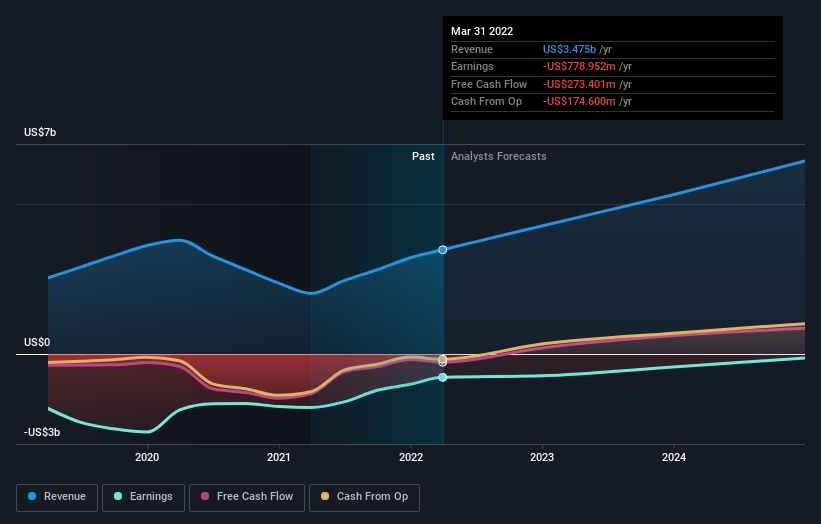Further weakness as Lyft (NASDAQ:LYFT) drops 38% this week, taking three-year losses to 62%
If you are building a properly diversified stock portfolio, the chances are some of your picks will perform badly. But the last three years have been particularly tough on longer term Lyft, Inc. (NASDAQ:LYFT) shareholders. Regrettably, they have had to cope with a 62% drop in the share price over that period. And more recent buyers are having a tough time too, with a drop of 61% in the last year. The falls have accelerated recently, with the share price down 57% in the last three months. This could be related to the recent financial results - you can catch up on the most recent data by reading our company report.
With the stock having lost 38% in the past week, it's worth taking a look at business performance and seeing if there's any red flags.
View our latest analysis for Lyft
Given that Lyft didn't make a profit in the last twelve months, we'll focus on revenue growth to form a quick view of its business development. Generally speaking, companies without profits are expected to grow revenue every year, and at a good clip. That's because fast revenue growth can be easily extrapolated to forecast profits, often of considerable size.
In the last three years Lyft saw its revenue shrink by 1.9% per year. That is not a good result. The share price decline of 18% compound, over three years, is understandable given the company doesn't have profits to boast of, and revenue is moving in the wrong direction. Having said that, if growth is coming in the future, now may be the low ebb for the company. We'd be pretty wary of this one until it makes a profit, because we don't specialize in finding turnaround situations.
The graphic below depicts how earnings and revenue have changed over time (unveil the exact values by clicking on the image).
Lyft is well known by investors, and plenty of clever analysts have tried to predict the future profit levels. You can see what analysts are predicting for Lyft in this interactive graph of future profit estimates.
A Different Perspective
Lyft shareholders are down 61% for the year, falling short of the market return. The market shed around 9.8%, no doubt weighing on the stock price. The three-year loss of 18% per year isn't as bad as the last twelve months, suggesting that the company has not been able to convince the market it has solved its problems. We would be wary of buying into a company with unsolved problems, although some investors will buy into struggling stocks if they believe the price is sufficiently attractive. It's always interesting to track share price performance over the longer term. But to understand Lyft better, we need to consider many other factors. Consider for instance, the ever-present spectre of investment risk. We've identified 3 warning signs with Lyft , and understanding them should be part of your investment process.
But note: Lyft may not be the best stock to buy. So take a peek at this free list of interesting companies with past earnings growth (and further growth forecast).
Please note, the market returns quoted in this article reflect the market weighted average returns of stocks that currently trade on US exchanges.
Have feedback on this article? Concerned about the content? Get in touch with us directly. Alternatively, email editorial-team (at) simplywallst.com.
This article by Simply Wall St is general in nature. We provide commentary based on historical data and analyst forecasts only using an unbiased methodology and our articles are not intended to be financial advice. It does not constitute a recommendation to buy or sell any stock, and does not take account of your objectives, or your financial situation. We aim to bring you long-term focused analysis driven by fundamental data. Note that our analysis may not factor in the latest price-sensitive company announcements or qualitative material. Simply Wall St has no position in any stocks mentioned.

 Yahoo Finance
Yahoo Finance 
